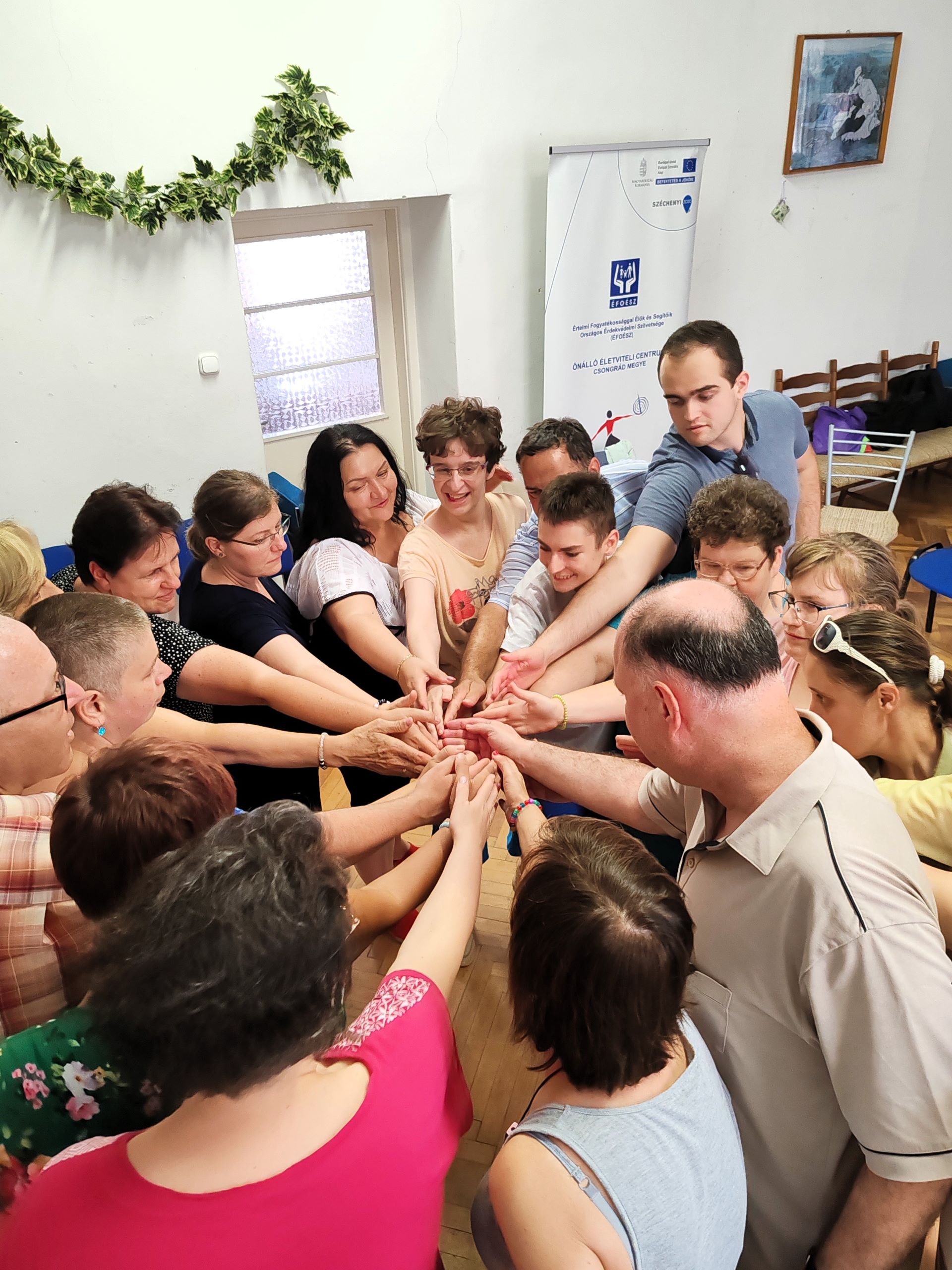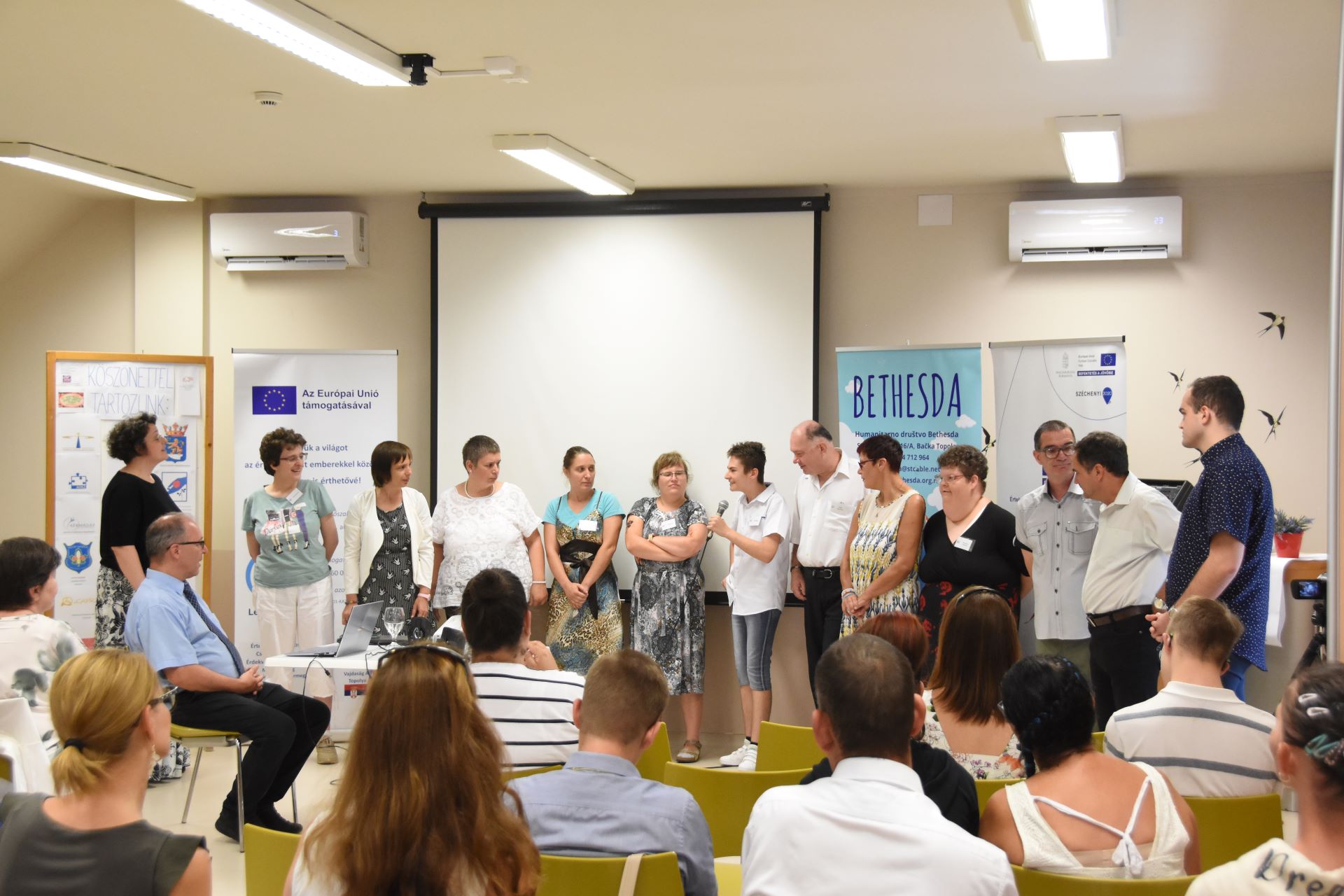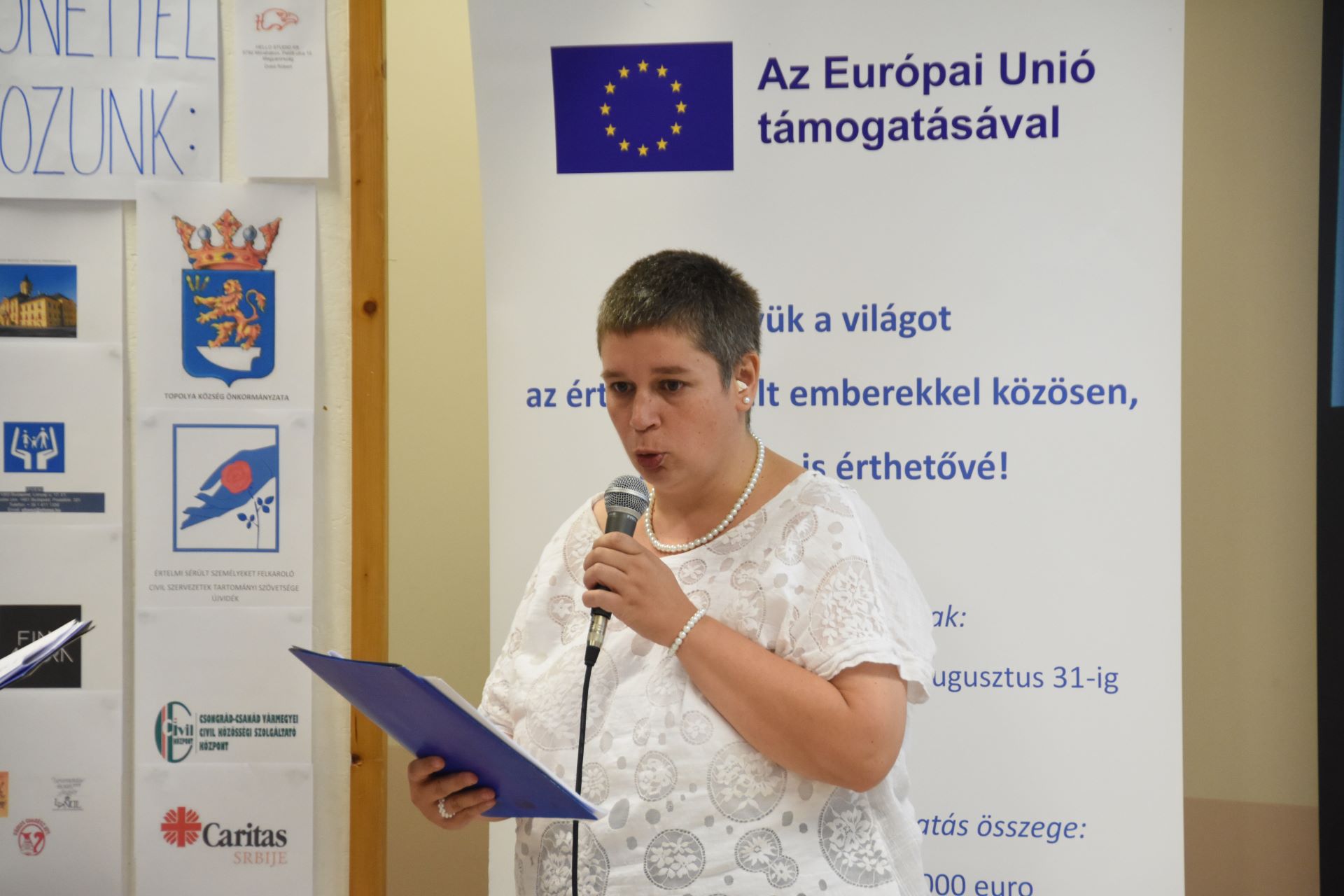
Shared learning, equality and participation - an award-winning adult learning project for the empowerment of people with intellectual disabilities.
Let’s Make the World Understandable for Everyone!
Awarded Organization: Értelmi Fogyatékosok Csongrád Megyei Érdekvédelmi Szervezete Közhasznú Egyesület (Public Benefit Association for the Advocacy of People with Intellectual Disabilities in Csongrád County)
Project Title: Let’s Make the World Understandable Together with People with Intellectual Disabilities! ("LépÉsKÉK")
Since 1982, the association’s mission has been to support individuals with intellectual disabilities and their families, to improve their quality of life, to advocate for their rights, and to promote equal opportunities. Their primary focus is to support independent living and self-advocacy for people with disabilities.
Regarding their award-winning project, Let’s Make the World Understandable Together with People with Intellectual Disabilities!, we spoke with adult education expert Péter László Horváth, as well as representatives of their partner organization from Vojvodina (Bethesda Charity Service – Topolya, Serbia). In line with the association's core values, self-advocates also shared their views.
What inspired the project?
The project originated from the realization that learning and participation are often hindered not by lack of ability but by lack of access to information. There is also a strong belief that individuals with intellectual disabilities are capable of making decisions and acting independently with tailored support. That’s why the team developed an education and communication model where self-advocates not only learn but also contribute as trainers, content creators and experts.
What activities were implemented?
Among the main activities of the project, an inclusive opening event was held in Topolya with the active participation of self-advocates, along with a training for professionals on creating easy-to-understand information, and a 20-hour training for self-advocates, led by trainers with intellectual disabilities using their own developed, easy-to-understand materials. The project was closed with a public closing event in Szeged, where the self-advocates performed as presenters. Inquirers could follow the event online. Additionally, self-advocates were involved in project management and received payment for this. During the project, 14 publications were produced, which is a significant number compared to the originally planned 5 publications.
Every element of the project was permeated by joint learning, equality, and participation.
What was the most memorable moment of the project for you?
There were several such moments; it is impossible to highlight just one. It was already an important moment when we received the notification that we had won the grant to implement the program. The opening event in Topolya also remains very memorable, where a self-advocate participant hosted the event as a housemaster. This day was a milestone not only for them but also for us: it strengthened our belief that trust and real tasks provide space for development.
At the closing event, the self-advocate participants appeared on stage as full-fledged presenters; they shared their feelings about what the joint work and learning meant to them. These were not just presentations but confident speeches, backed by the experience of community, development, and true presence.
Self-advocates’ presentation at the closing conference
A defining moment was also when, during the grant writing, the professional group planned the content of the self-advocates’ training, but during the work it turned out that the self-advocates’ needs differed significantly from the original ideas, so the program took a completely new direction. After that, all self-advocates actively participated in the planning, and the new training program was based on their needs. They also played a key role in implementation, as they filled the role of trainers themselves, freely deciding on the form of their participation and their assistants. But I would also highlight when Spanish, Slovenian, and German self-advocates and professionals were present in the professional training program in Algyő. We worked very well together, and despite the language differences, the self-advocates quickly attuned to each other.
According to the self-advocates participating in the program, the most memorable moments were:
"It remains memorable when I could try myself as a program manager: the feeling of being trusted and working independently. I was also happy when, outside the official program, invited foreign self-advocates visited me in the residential home, with whom we then had dinner and talked together. It is fantastic that I was able to prepare a report on the self-advocates’ training, which I wrote alone and was published as an article in the scientific journal Disability and Society. I also will never forget when we cut the LépÉsKÉK cake and then ate it together at the closing event."
"The most memorable moment was when I first met a Slovenian self-advocate, who came up to me during the training break and encouraged me because I was very nervous about my presentation."
What are the most important benefits of the project?
The greatest benefit of the project was that it has brought real and visible change – both on an individual and organizational level.
We created opportunities for our members that had no precedent before: they could learn, teach, give and receive feedback, and speak publicly in an international cooperation. This gave them not only knowledge but also confidence, social connections, and a vision for the future. The self-advocates were paid, gained new experiences, and could try themselves in new situations.
From the organization's perspective, the project brought a new operational culture. The international partnership, informal learning situations, and the active involvement of self-advocates meant professional progress. Extensive international networking was valuable and useful. Our association finally received media attention: we had numerous appearances thanks to the project.
According to the participating partner and the self-advocates, the most important benefits were:
"Getting to know easy-to-understand language and materials was important. I pay more attention to whether my environment understands what I want to say. New relationships are also important to me. I have improved a lot in empathy and cooperation; my personality has developed. The work tasks I could perform were also important. It was very honourable for me to participate in the project."
"On a personal level, the most important thing is that I learned humility: to let others also succeed. I tried myself as a program manager, then my peers nominated me again for this task, and although I appreciated the trust, I did not accept the nomination so that others could also have the opportunity to participate in this great task. This flexible change made it possible for many of us to gain new knowledge and practice."
"The most important personal outcome of the project is that I have become much braver; now I have confidence; I no longer get emotional when standing before people, e.g., as a presenter."
What change did the project initiate within the association?
The biggest change is that participation, the self-advocacy attitude, and easy-to-understand communication are now present in our practice.
Through participation in the project, the creation of easy language materials came into a new light, and we learned a lot in this area. Cooperation with Caritas Belgrade is also an important benefit of the project. Our activities in self-advocacy and information accessibility have risen to a new level, opening new paths for us.
Our digital working methods have also developed a lot thanks to the project. The tools introduced during the project are now a natural part of our internal communication and joint work. Moreover, even our members use them, which means a new kind of independence for them.
The change goes far beyond the project: it brought a new mindset, which we apply in our future programs.
How has the impact of the project been integrated into the association’s daily life?
We acquired a methodological toolkit that enables decision-making, learning, and supporting independence to be integrated systemically into our daily lives. Everything we learned, we use in the association’s self-advocacy sessions.

Self-advocates’ farewell ritual
What are you most proud of regarding the project?
We are most proud that people with intellectual disabilities have gained real professional roles – many for the first time in their lives. The salaries of people with intellectual disabilities were determined equally with professionals, based on the principle of equal pay. Their participation was not symbolic but carried responsibility and content. We are also proud that we overachieved our commitments regarding the publications, which self-advocates actively shaped as creators.
We believe that this kind of mindset – where everyone is competent and value-creating – is not only the key to the project’s success but can also serve as an example for other organizations.
The partner and self-advocates participating in the program are proud of the following:
"I am most proud of the self-advocates' performance: at the beginning of the project, I had doubts; I did not think they were capable of so much if we let them assert themselves and only gave support when they really needed it and asked for it!"
"I am most proud of my capability to lead the program and explain things as a teacher that everyone understood."
"I am proud of giving training as a self-advocate to professionals about checking the understandability of easy language information."
"I am proud that we came up with the content of our training together with the self-advocates in Topolya, and among the collected ideas, we voted on the programs that fit within the time frame."
How did the project affect participants personally?
During the project, we saw how deep and lasting the effect can be when someone is truly involved, listened to, and allowed to develop. Many participants travelled abroad for the first time, spoke publicly, or learned in a structured environment. They received official certificates and paid work opportunities, which was not only a professional success but also the beginning of a new chapter in their lives.
The personal development of the self-advocates, building and maintaining friendships is noteworthy. Everyone was able to improve compared to themselves; for example, self-advocates were able to present and teach their hobbies to each other; they eagerly awaited opportunities to teach and perform. The most important, however, was that their self-image changed. The experience of self-empowerment started many off a longer path toward self-advocacy, learning, employment, and community participation.
We learned a lot about how to truly help self-advocates well—not instead of them, but working with them, always raising the bar a little higher, but not unrealistically high, always considering each self-advocate’s abilities. The "nothing about us without us" principle is deeply ingrained in our minds.
According to the self-advocates participating in the program, the most important impact:
"We have become much more resourceful, confident, and brave. There are situations, for example, when we have to express our opinions or speak publicly, in which we have improved a lot."
"As a self-advocate, today I can even prepare a presentation independently and give the presentation alone; I can outline, and I have an independent concept of what I want to talk about. My communication skills have improved a lot (e.g., I can independently summarize the content of a presentation I heard)."
Tóth Éva self-advocate, giving a presentation
Which result would you highlight?
If we had to highlight a single result, it would be the easy-to-understand publication titled “How to Use Less Electricity?”. Not only because of its content but also because of the way it was created. This informational booklet is a product of the ACTIVE project by Caritas Serbia, which the organization made available to us free of charge for Hungarian language adaptation within an open, international partnership. Bethesda Charity Service and ÉFCSMÉSZ worked together to revise the material so that it would be understandable, accessible, and usable in the Hungarian context. This work was not a mere translation but a genuine collaboration: our self-advocate participants actively reviewed, corrected, and shaped the text. The content is simple yet very useful: energy-saving advice for everyone, in a clear and easy-to-apply form. The publication is also available in digital format, and the feedback option allows the material to be further developed based on users’ experiences.
Based on the ideas, dreams, and wishes of Hungarian and foreign self-advocates participating in the program, we have since applied for two more mobility programs - both of which we won. This way, we can continue the collaborations we started.
Who else, besides the target group, might benefit from the result?
The project’s results widely promote equality, participatory approaches, self-advocacy and information accessibility. The project outcomes (e.g., the publications) serve all people with intellectual disabilities who have access to them, and their families, and even people or children who speak other languages.
Information accessibility can also help many other groups: children, elderly people, those with low educational attainment, those who speak other languages, people needing support to understand, or even those experiencing information overload.
The publications, trainings, and awareness-raising materials produced during the project can be applied in social welfare, education, healthcare, culture, public administration, and other civil organizations. Additionally, they impact family members, guardians, professionals (special educators and social workers), and decision-makers. All receive new perspectives on what participation, independence, and partnership mean. The results can also be utilized by those who teach or study disability studies, special education, or social work.
How were the project results disseminated?
For us, dissemination was not just a mandatory task but a conscious strategy that shaped our work already during project planning. Our goal was to reach broader professional, institutional, and civil communities both domestically and internationally. The opening and closing events, social media, professional publications, and open-access publications all served this purpose.
Since then, we have shared the results in the “Judy program” of the National Advocacy Alliance for People with Intellectual Disabilities and Their Helpers, with special emphasis on presenting new roles for self-advocates. We integrated the materials into the curriculum of the administrative training program at the National University of Public Service and into the training of master’s students in educational sciences at Apor Vilmos Catholic College in Vác.
In Slovenia, Portugal, and Spain - as part of adult learner mobility programs - we made instant soup and coconut balls together with local self-advocates based on easy-to-understand illustrated recipe books developed in the program (these publications contain no text). The Portuguese partner found the publications very innovative and decided they would also create similar materials in the future, with professional support provided by our organization.
What does the Erasmus+ Excellence Award mean to you?
The Nívódíj is a great honour and huge recognition, an extremely important milestone in the life of our organization. It fills us with joy and pride and confirms that it was worth seeking new paths and stepping out of familiar frameworks. We have been working with adults with intellectual disabilities for more than twenty years, but easy-to-understand language and the practice of self-advocacy were less familiar areas for us.
This was our first European Union project, during which we learned a great deal. The award also honours the openness and inclusivity in which people with intellectual disabilities were not only self-advocates but true partners.
| This recognition strengthens us in the belief that thinking together, equality, and inclusive approaches pay off - professionally, personally, and communally. We can say that we represent exemplary values and that others can adopt our methods. Self-advocates are people with intellectual disabilities who stand up for their interests and actively participate in decisions that affect them. |
Introducing the 2025 Erasmus+ Excellence Award Award-winning projects!
Last modified: 09-07-2025

















